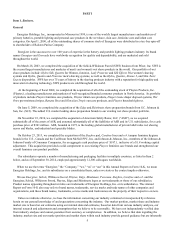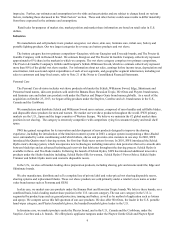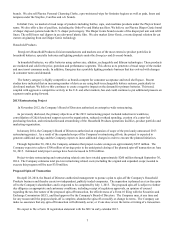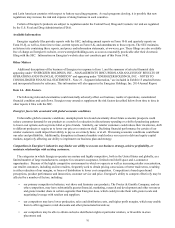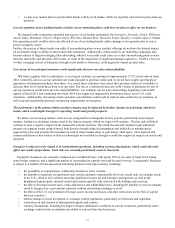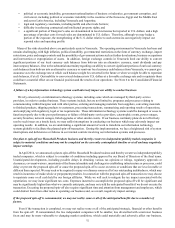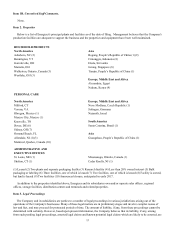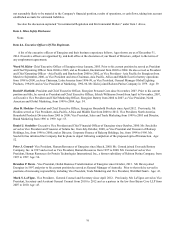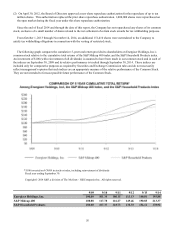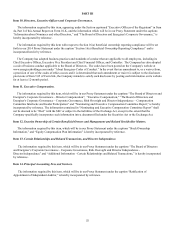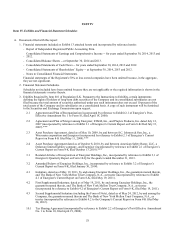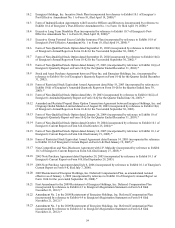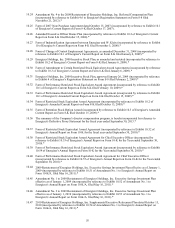Energizer 2014 Annual Report Download - page 19
Download and view the complete annual report
Please find page 19 of the 2014 Energizer annual report below. You can navigate through the pages in the report by either clicking on the pages listed below, or by using the keyword search tool below to find specific information within the annual report.Company maintains business interruption insurance to potentially mitigate the impact of business interruption, but such
coverage may not be sufficient to offset the financial or reputational impact of an interruption.
Energizer has a substantial level of indebtedness and is subject to various covenants relating to such indebtedness, which
limits its discretion to operate and grow its business.
Energizer's current debt level is approximately $2.3 billion. We may be required to dedicate a substantial portion of our
cash to debt service, thereby reducing funds available to fund working capital, capital expenditures, acquisitions and
investments and other general corporate purposes. Our failure to make scheduled interest payments or to repay or refinance the
indebtedness at maturity or obtain additional financing as needed could have a material adverse effect on our business.
Additionally, many of our debt instruments are subject to certain financial and other covenants, including debt ratio tests.
We may be in breach of such covenants in the event of future declines in our operating cash flows or earnings performance,
foreign currency movements, or other events. In the event of such breach, our lenders may be entitled to accelerate the related
debt as well as any other debt to which a cross-default provision applies, and we could be required to seek amendments or
waivers under the debt instruments or to refinance the debt. There is no assurance that we would obtain such amendments or
waivers or effect such refinancing, or that we would be able to do so on terms similar to our current debt instruments. The
covenants and financial ratio requirements contained in our debt instruments could also increase our vulnerability to general
adverse economic and industry conditions, limit our flexibility in planning for, or reacting to, changes in our business and the
markets in which we operate, place us at a competitive disadvantage as compared to our competitors that have greater financial
flexibility or limit, among other things, our ability to borrow additional funds.
Our credit ratings are important to our cost of capital.
The major credit rating agencies periodically evaluate our creditworthiness and have given us specified credit ratings.
These ratings are based on a number of factors, which include our financial strength and financial policies as well as our
strategies, operations and execution. These credit rating agencies have also indicated that our proposed spin-off transaction and
the capital structure of each business following the transaction could cause them to re-evaluate their credit ratings. We have
historically aimed to maintain our current ratings as they serve to lower our borrowing costs and facilitate our access to sources
of capital on terms that we consider advantageous to our business. In connection with our proposed spin-off transaction,
however, we may be unable to do so or choose not to do so. Failure to maintain our credit ratings could adversely affect the
interest rate in future financings, liquidity, competitive position and access to capital markets.
There can be no guarantee that we will continue to make dividend payments or repurchase stock.
Although our Board of Directors has authorized a share repurchase program and initiated a quarterly cash dividend payable
on our Common Stock, any determinations to continue to repurchase Common Stock or to continue to pay cash dividends will
be based primarily upon our financial condition, results of operations, available U.S. cash, business requirements and the Board
of Directors' continuing determination that the repurchase program and the payment of dividends under the dividend policy are
in the best interests of shareholders and are in compliance with all laws and agreements applicable to the repurchase and
dividend programs. Additionally, following the proposed spin-off transaction, our Board of Directors may reduce or eliminate
the share repurchase program or our quarterly cash dividend.
If Energizer fails to adequately protect its intellectual property rights, competitors may manufacture and market similar
products, which could adversely affect our market share and results of operations.
The vast majority of our total revenues are from products bearing proprietary trademarks and brand names. In addition,
Energizer owns or licenses from third parties a considerable number of patents, patent applications and other technology.
Energizer relies on trademark, trade secret, patent and copyright laws to protect our intellectual property rights. There is a risk
that Energizer will not be able to obtain and perfect or maintain our own intellectual property rights or, where appropriate,
license intellectual property rights necessary to support new product introductions. In addition, even if such rights are protected
in the United States, the laws of some other countries in which Energizer's products are or may be sold do not protect
intellectual property rights to the same extent as the laws of the United States. We cannot be certain that our intellectual
property rights will not be invalidated, circumvented or challenged in the future, and Energizer could incur significant costs in
connection with legal actions relating to such rights. As patents expire, we could face increased competition or decreased
royalties, either of which could negatively impact our operating results. If other parties infringe our intellectual property rights,
they may dilute the value of our brands in the marketplace, which could diminish the value that consumers associate with our
brands and harm our sales.
15


